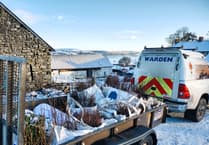A nest tower, providing homes for different species of wildlife, is now in place within the Llandrindod Wells Lake Local Nature Reserve.
Providing nesting places for swifts, house martins and other small birds, the tower will also be a perfect roosting space for bats.
Swifts and house martins were both added to the Red List of Threatened Species for the first time in 2021 due to worsening declines in breeding populations and the 12 species of bat found in Powys are all protected.
The decline in these different species is due to various factors including a lack of nesting sites, loss of habitat and declines in insects which are a vital food source. This nesting tower will help by providing nesting places for birds and roosting opportunities for bats such as the Common Pipistrelle and Soprano Pipistrelle.
It may take time for birds to start using the nest tower. Swifts, martins and swallows are loyal to their previous nest sites so it is likely, in time that juvenile birds will find the nest sites and start to use them. A solar powered Swift Caller system, which you may hear, will help to attract swifts to the new nest tower as they look for nesting sites in May for later in the year.
An information panel detailing the species that will use the nesting tower has also been installed in the meadow alongside Grosvenor Road.
Cllr Jackie Charlton, Cabinet Member for a Greener Powys said: “Despite its abundance of countryside and open spaces, even in our idyllic and rural county of Powys the decline in nature and wildlife is still a huge issue.
“It is estimated that 1 in 6 of Wales’ species are at risk of extinction and that over the past 50 years 73 species have already become extinct and a further 666 species are threatened with extinction.
“We must do all we can to help reduce this decline and the installation of this nesting tower in Llandrindod Wells is just one of the ways that the Powys Nature Partnership is taking action and supporting nature recovery in Powys.”




